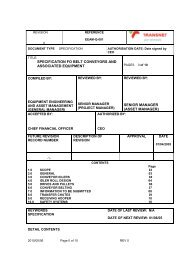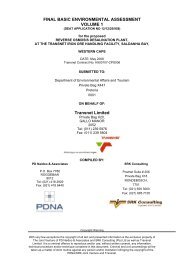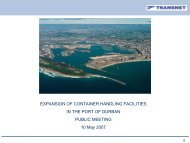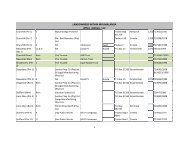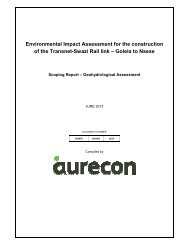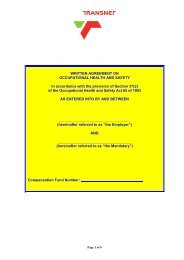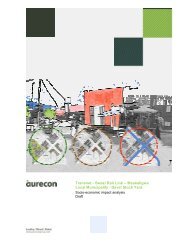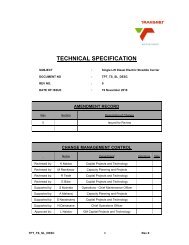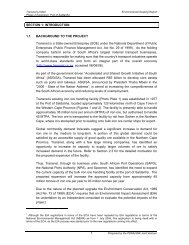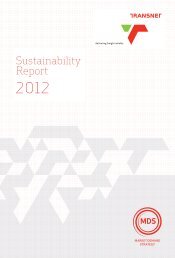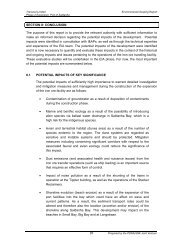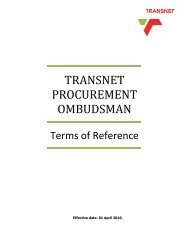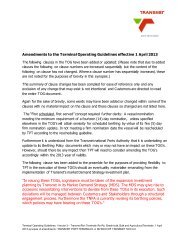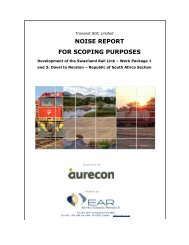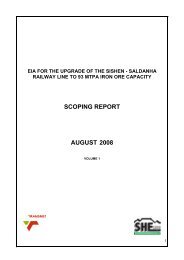Version1: Applicable from 1 April 2011 - Transnet
Version1: Applicable from 1 April 2011 - Transnet
Version1: Applicable from 1 April 2011 - Transnet
You also want an ePaper? Increase the reach of your titles
YUMPU automatically turns print PDFs into web optimized ePapers that Google loves.
5.4.3. Where two scheduled or planned vessels indicate that they are unable to work<br />
productively as a result of a perceived danger by each vessel of contamination of its<br />
cargo by the cargo of the other vessel, the junior vessel may be required to move off<br />
the berth at its own cost and will follow the senior vessel once the latter has<br />
completed working, provided that the junior vessel can then be worked productively.<br />
5.4.4. In all circumstances TPT has the right, in its sole discretion, to cease cargo working<br />
and to require a vessel to vacate a berth at its own cost and expense and to be rescheduled<br />
for later cargo working if, in the opinion of T PT, dust generated by cargo<br />
being worked on such a vessel poses a hazard of any nature to any party<br />
whatsoever, or the environment. In such event, TPT will endeavour to inform the<br />
Customer/ vessel or duly authorized representative of such decision in writing.<br />
5.5. Delays caused by Force majeure<br />
5.5.1. If a planned vessel is requested to vacate a berth due to Force Majeure its removal<br />
will not affect its right to the berth and it will be retained as a senior vessel, but at<br />
the discretion of TPT. Once the Force Majeure has ended, such vessel may choose<br />
to:<br />
5.5.1.1. re-schedule to its original berth, if and when available, at the cost of the<br />
party responsible for its removal or;<br />
5.5.1.2. be re-scheduled to occupy a different available berth at the cost of the<br />
party responsible for its removal and no cross haul charges will accrue,<br />
although productivity may be affected. In each instance an ETA update will<br />
be required and the CPO will need to prioritise a suitable return berth<br />
accordingly. This may affect other scheduled or planned vessels, but TPT<br />
will not be liable for any claims arising <strong>from</strong> any delay occasioned thereby.<br />
5.6. Delays occasioned by cargo<br />
5.6.1. If a vessel is delayed for more than two (2) hours due to having to wait for road or<br />
rail transport to deliver the cargo, the relevant stand-by charges will apply to the<br />
cargo owner/representative in respect of any delay beyond the two (2) hour period.<br />
5.6.2. If a working vessel is delayed for more than two (2) hours due to the unavailability<br />
of cargo occasioned by cargo delays attributable to an HBI, stand-by charges will<br />
apply to the cargo owner/representative, for any delay beyond the two (2) hour<br />
period or may be requested to vacate the berth after a delay of four hours. ( Refer<br />
clause 5.1.1)<br />
5.6.3. Stand-by charges will not be raised if any cargo delays experienced are due to the<br />
movement of cargo between TPT berths and while under the direct control of TPT.<br />
TPT will not be liable for any claims arising <strong>from</strong> any delay occasioned thereby.<br />
Terminal Operating Guidelines: Version 3 – <strong>Transnet</strong> Port Terminals Ro-Ro, Break-bulk, Bulk and Agricultural Terminals: 1 <strong>April</strong> 2013<br />
TRANSNET PORT TERMINALS, A DIVISION OF TRANSNET SOC Ltd 26



